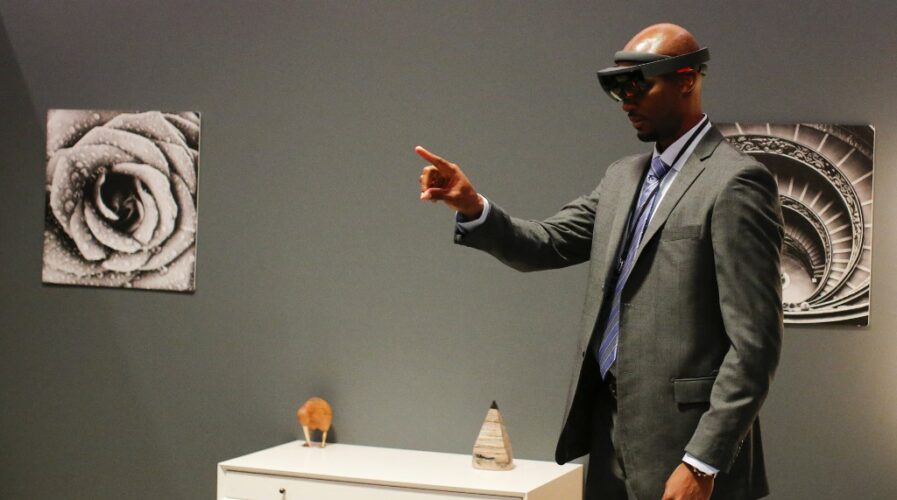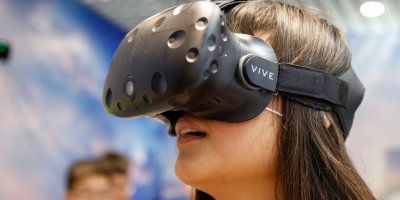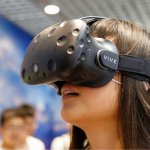
Event attendees experience mixed reality using Microsoft HoloLens. (Photo by EDUARDO MUNOZ / Microsoft Japan Co., Ltd. / Microsoft Japan)
Microsoft thinks mixed reality is the future of remote collaboration
Technology giant Microsoft set the stage earlier this month, quite literally, for a future in which long-distance coworkers can collaborate as though in the same room, using augmented reality glasses and cloud computing power.
The US technology colossus launched the Microsoft Mesh platform at its annual Ignite developers conference, which was a streamed event this year due to the pandemic.
“One of the easiest ways to think about it is Microsoft Mesh connects the physical and digital worlds, allowing us to transcend the traditional boundaries of space and time,” co-creator Simon Skaria said in a video presentation.
Microsoft technical fellow Alex Kipman, whose team created HoloLens augmented reality eyewear that has caught on with businesses, appeared as a hologram to unveil Mesh on a virtual stage.
Mesh is powered by Azure cloud computing systems that combine data center processing power with artificial intelligence.
Holohedrons headgear with a US$3,500 price tag is used to overlay digital imagery on real world settings, but the Mesh platform has the potential to be synced to virtual reality gear such as Facebook-owned Oculus as well as smartphones, according to Kipman.
The future of reality is ‘mixed’
Apple, Google, and Facebook are among the tech titans investing in mixed reality.
Mesh is designed to let people collaborate and share holographic experiences in real time no matter how far apart they may be, presentations showed.
“You can actually feel like you’re in the same place with someone sharing content or you can teleport from different mixed reality devices and be present with people even when you’re not physically together,” Kipman said.
People will initially be able to appear in Mesh experiences as avatars, but in the future will be able to project lifelike holograms of themselves, according to Microsoft.
The pandemic caused a dramatic shift to working and learning remotely, with reliance on cloud computing instead of offices or classrooms expected to remain part of people’s lives.
The Redmond, Washington-based company expects outside developers and partners to build applications on Mesh, and is working to integrate it in products such as Teams virtual collaboration service.
Niantic chief John Hanke took part in the Ignite presentation with a concept version of its popular Pokémon Go mobile game running on HoloLens.
“This notion of bringing my virtual friends along with me as I go out and walk and explore the world — I just love that concept and I’m really interested to see what we can do with that,” Hanke said.
© Agence France-Presse
READ MORE
- Ethical AI: The renewed importance of safeguarding data and customer privacy in Generative AI applications
- How Japan balances AI-driven opportunities with cybersecurity needs
- Deploying SASE: Benchmarking your approach
- Insurance everywhere all at once: the digital transformation of the APAC insurance industry
- Google parent Alphabet eyes HubSpot: A potential acquisition shaping the future of CRM


